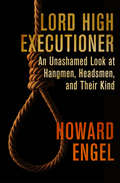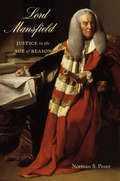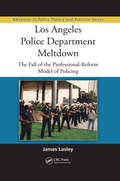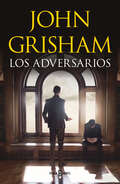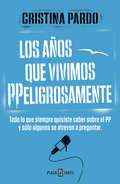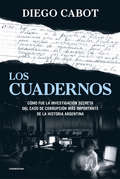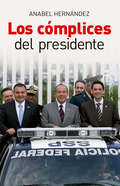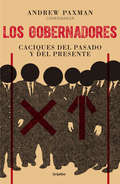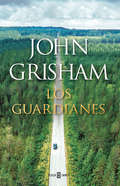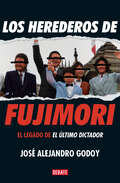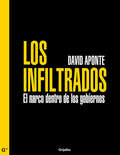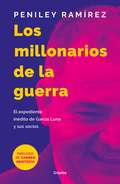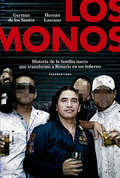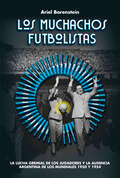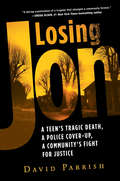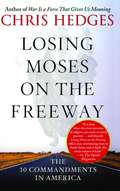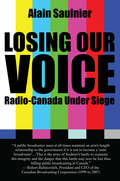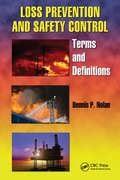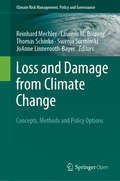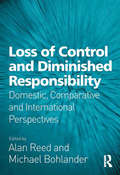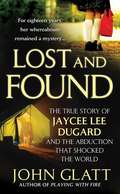- Table View
- List View
Lord High Executioner: An Unashamed Look at Hangmen, Headsmen, and Their Kind
by Howard EngelA grisly tour of hangings, electrocutions, beheadings—and other state-sanctioned deaths that are part of the long history of the death penalty. In Lord High Executioner, award-winning writer Howard Engel traces the traditions of capital punishment from medieval England and early Canada to the present-day United States. Throughout &“civilized&” history, executioners employed on behalf of the kingdom, republic, or dictatorship have beheaded, chopped, stabbed, choked, gassed, electrocuted, or beaten criminals to death—and Engel doesn&’t shy away from the gritty details of the executioner&’s lifestyle, focusing on the paragons, buffoons, and sadists of the dark profession. Packed with all-too-true stories, from hapless hangings to butchered beheadings, this historically accurate look at the executioner&’s gruesome work makes for a thoroughly gripping read.
Lord Mansfield
by Norman PoserIn the first modern biography of Lord Mansfield (1705-1793), Norman Poser details the turbulent political life of eighteenth-century Britain's most powerful judge, serving as chief justice for an unprecedented thirty-two years. His legal decisions launched England on the path to abolishing slavery and the slave trade, modernized commercial law in ways that helped establish Britain as the world's leading industrial and trading nation, and his vigorous opposition to the American colonists stoked Revolutionary fires. Although his father and brother were Jacobite rebels loyal to the deposed King James II, Mansfield was able to rise through English society to become a member of its ruling aristocracy and a confidential advisor to two kings. Poser sets Mansfield's rulings in historical context while delving into Mansfield's circle, which included poets (Alexander Pope described him as "his country's pride"), artists, actors, clergymen, noblemen and women, and politicians. Still celebrated for his application of common sense and moral values to the formal and complicated English common law system, Mansfield brought a practical and humanistic approach to the law. His decisions continue to influence the legal systems of Canada, Britain, and the United States to an extent unmatched by any judge of the past. An illuminating account of one of the greatest legal minds, Lord Mansfield presents a vibrant look at Britain's Age of Reason through one of its central figures.
Lord Mansfield: Justice in the Age of Reason
by Norman S. PoserIn the first modern biography of Lord Mansfield (1705-1793), Norman Poser details the turbulent political life of eighteenth-century Britain's most powerful judge, serving as chief justice for an unprecedented thirty-two years. His legal decisions launched England on the path to abolishing slavery and the slave trade, modernized commercial law in ways that helped establish Britain as the world's leading industrial and trading nation, and his vigorous opposition to the American colonists stoked Revolutionary fires. Although his father and brother were Jacobite rebels loyal to the deposed King James II, Mansfield was able to rise through English society to become a member of its ruling aristocracy and a confidential advisor to two kings. Poser sets Mansfield's rulings in historical context while delving into Mansfield's circle, which included poets (Alexander Pope described him as "his country's pride"), artists, actors, clergymen, noblemen and women, and politicians. Still celebrated for his application of common sense and moral values to the formal and complicated English common law system, Mansfield brought a practical and humanistic approach to the law. His decisions continue to influence the legal systems of Canada, Britain, and the United States to an extent unmatched by any judge of the past. An illuminating account of one of the greatest legal minds, Lord Mansfield presents a vibrant look at Britain's Age of Reason through one of its central figures.
Los Angeles Police Department Meltdown: The Fall of the Professional-Reform Model of Policing
by James LasleyOnce considered among the most respected police departments in the world, the LAPD suffered a devastating fall from grace following the 1991 police officer beating of Rodney King and the Los Angeles riots stemming from the officers acquittal in 1992. Unique to the literature of policing, management, and policy studies, Los Angeles Police Departmen
Los adversarios
by John GrishamTres emocionantes historias del maestro Grisham con el mundo de la ley como hilo conductor. «Vuelta a casa» nos lleva de regreso a Ford County, escenario de muchas de las inolvidables historias de John Grisham. Esta vez Jake Brigance no está en el tribunal; quien acude a él es un viejo amigo, Mack Stafford, un exabogado de Clanton. Tres años antes, Mack se convirtió en una leyenda local cuando robó el dinero de sus clientes, se divorció de su mujer, se declaró en bancarrota y abandonó a su familia en mitad de la noche sin que nunca más se volviera a oír hablar de él... hasta ahora. Mack ha vuelto y confía en sus viejos colegas para que le ayuden. Pero su regreso no resulta como lo había planeado. En «Luna de fresa», Cody Wallace, un joven preso, se encuentra en el corredor de la muerte a solo tres horas de su ejecución. Sus abogados no pueden salvarle, el tribunal le ha cerrado sus puertas y el gobernador se ha negado a una última petición de clemencia. Mientras el reloj avanza, Cody tiene una última petición.Los adversarios está protagonizado por los hermanos Malloy, Kirk y Rusty, dos ambiciosos y exitosos abogados que heredaron un próspero bufete cuando el fundador, su padre, fue enviado a prisión por el asesinato de su mujer. Kirk y Rusty se aborrecen y solo se hablan cuando es estrictamente necesario, y el bufete se encuentra en plena decadencia y a punto de desintegrarse. Y ahora que su padre podría salir de la cárcel antes de lo esperado..., el enfrentamiento entre los Malloy parece inevitable. La crítica ha dicho:«La obra de Grisham -siempre un entretenimiento excelente- está evolucionando a algo más serio, más poderoso, más merecedor de su excepcional talento».The Washington Post «Estas tres historias en un solo volumen muestran a un Grisham en su mejor momento... Una pequeña obra maestra».Daily Mail «El mejor autor vivo de thriller».KEN FOLLETT«John Grisham es uno de los mejores escritores que tenemos en Estados Unidos en estos momentos».The New York Times «Tres chispeantes historias de Grisham por el precio de una... Un fantástico entretenimiento».Irish Independent
Los años que vivimos PPeligrosamente: Todo lo que siempre quisiste saber sobre el PP y solo algunos se atreven a preguntar
by Cristina PardoUna crónica fresca, ácida, divertida e inteligente de la trastienda política de los últimos años. ¿Cuántas versiones regionales existen del himno del PP? Y ¿cuántas puede escuchar un ser humano y mantenerse cuerdo? ¿Es inconveniente servir chorizos en mitad de un escándalo de corrupción? ¿Existe alguien que sepa qué es una indemnización en diferido en forma de simulación? ¿Cuántas veces puede cambiar de opinión un ministro? ¿Cuánta tensión puede soportar el cuerpo humano durante una rueda de prensa? ¿Contiene el diccionario suficientes sinónimos para evitar la palabra «rescate»? ¿Puede el Gobierno terminar la legislatura sin recortar el capote de la Virgen del Rocío? Los años que vivimos PPeligrosamente es una crónica fresca, ácida, divertida e inteligente de la trastienda política reciente. Un periodo austero, sobre todo en buenas noticias, en el que necesitamos más que nunca lalabor de periodistas como Cristina Pardo, capaces de contar, y a veces traducir, lo que sucede a nuestro alrededor. Observación periodística, ingenio y denuncia en un libro que habla abiertamente de política sin dramatizar, y sin perder nunca la sonrisa.
Los cuadernos: Cómo fue la investigación secreta del caso de corrupción más importante de la historia argentina
by Diego CabotCómo se hizo la investigación periodística que develó cómo el kirchnerismo recaudaba millones de dólares de empresarios corruptos para financiar su aparato político y enriquecer funcionarios. 902 páginas10 años de recaudación ilegal43 compañías involucradas112 funcionarios y empresarios mencionados36.000 millones de dólares en efectivoLa trama secreta del caso de corrupción más importante de la historia argentina El 1 de febrero de 2005, Oscar Centeno empezó a escribir un diario de sus tareas como chofer de Roberto Baratta, el principal recaudador de dinero negro del kirchnerismo. Página a página aparecen funcionarios, empresarios y miembros del círculo gubernamental, hoteles y domicilios adónde se retiraban paquetes enormes de billetes. Desde los pedidos de helado para el ministro Julio De Vido -la cabeza del sistema recaudador al servicio de Néstor Kirchner- hasta las facturas de los bolsos para transportar sobornos millonarios que se dejaban en la Casa Rosada, la Residencia de Olivos y el edificio del matrimonio presidencial. Una década después, Centeno había completado 8 cuadernos y un anotador. Cuando llegaron a sus manos, Diego Cabot se dedicó a chequear uno a uno los datos que allí se consignaban. Meses más tarde, esa pesquisa minuciosa y secreta se transformó en la primicia más espectacular de la historia y dio pie a la mayor causa anticorrupción de la que se tenga memoria en el país. En Los Cuadernos, Cabot revela al fin toda la verdad de una investigación sin precedentes que generó cientos de especulaciones, operaciones y contra operaciones, arrepentidos, denuncias, encarcelamientos y traiciones y que cambió para siempre la forma de hacer política en la Argentina.
Los cómplices del presidente
by Anabel HernándezLos cómplices del presidente contiene la denuncia más consistente y documentada que se ha hecho hasta ahora sobre corrupción e impunidad durante el presente sexenio. Los cómplices del presidente fue publicado originalmente a fines de 2008. Van más de 40 000 ejemplares vendidos desde entonces. En la nota a esta nueva edición en Debolsillo, la autora escribe: Han pasado un año y tres meses desde la aparición de Los cómplices del presidente. En este corto periodo el libro ha adquirido gran importancia y demanda una nueva lectura, incluso para mí como autora. Hoy más que nunca sus líneas se vuelven vigentes para comprender la convulsa época que vivimos. En septiembre de 2008, cuando le puse punto final a esta obra, tuve la certeza de que ninguno de los tres protagonistas, Felipe Calderón, Juan Camilo Mouriño y Genaro García Luna terminaría bien el sexenio. El tiempo me ha dado la razón. La muerte de Juan Camilo Mouriño lo convirtió en mártir y no en el político que debía rendir cuentas por sus abusos y excesos (aquí documentados). Calderón vive su propio infierno. Hoy García Luna es señalado públicamente por políticos de oposición como corrupto. Por todo esto, el libro permite entender lo que está sucediendo en nuestro país.
Los gobernadores: caciques del pasado y del presente
by Andrew PaxmanSomos testigos de una nueva época de corrupción y caciquismo en los estados. Desde los desfalcos de Javier Duarte hasta la mano dura de Rafael Moreno Valle, muchos gobernadores recientes son prueba contundente de que una mayor democracia electoral no necesariamente se traduce en un mayor Estado de derecho. Aun la Jefatura de Gobierno de Andrés Manuel López Obrador, a pesar de sus logros, fue criticada como autoritaria y tolerante de la venalidad. Por medio de doce perfiles, los colaboradores de este tomo -la mitad periodistas, la mitad académicos- señalan las raíces de la conducta caciquil y documentan el modus operandi de varios de los gobernadores "sobresalientes" de nuestros tiempos.
Los guardianes
by John GrishamUn hombre inocente fue condenado por asesinato hace veintidós años. Su abogado no parará hasta verle libre. Pero quienes le encerraron ya mataron una vez. Y están preparados para volver a hacerlo. NADIE LO CUENTA MEJOR QUE GRISHAM. En la pequeña ciudad de Seabrook, Florida, un prometedor abogado llamado Keith Russo fue asesinado a tiros una noche mientras trabajaba hasta tarde en su despacho. El culpable no dejó pistas. No hubo testigos, nadie tenía un motivo. Pero la policía pronto sospechó de Quincy Miller, un joven negro que había sido cliente de Russo.Miller fue juzgado y condenado a cadena perpetua. Durante veintidós años languideció en prisión, manteniendo su inocencia sin que nadie lo escuchara. Desesperado, escribe una carta al Ministerio de los Guardianes, una pequeña organización sin ánimo de lucro liderada por el abogado y sacerdote episcopaliano Cullen Post. Post viaja por el país luchando contra sentencias injustas y defendiendo a clientes olvidados por el sistema. Sin embargo, en el caso de Quincy Miller encuentra obstáculos inesperados. Los asesinos de Keith Russo son personas poderosas y despiadadas, y no quieren que Miller sea exonerado. Mataron a un abogado hace veintidós años, y matarían a otro sin pensarlo dos veces. La crítica ha dicho:«Grisham en su mejor, y más apasionada, forma.»Daily Mail «El mejor autor vivo de thriller.»Ken Follett «Estupendo. Conmovedor. Grisham lo ha vuelto a lograr. La longevidad creativa no es inusual en el género de suspense, pero lo que resulta único es la hazaña de mantener el ritmo de una novela al año sin que disminuya el ingenio o la calidad literaria.»The Washington Post «Escrito con su característico estilo sencillo y fluido. Grisham es el gran maestro del arte de crear personajes con destreza y de aumentar con habilidad la tensión en un crescendo sobrecogedor.»Irish Independent «Grisham ha escrito de nuevo un thriller lleno de suspense que se mezcla con temas de peso como las detenciones injustas, la pena de muerte y los prejuicios del sistema legal. Los personajes de esta novela son de primera clase.»Associated Press «Rápido y atrapante.»Daily Mirror Los lectores opinan...«Tiene un estilo narrativo que me ha gustado, muy ágil, unos magníficos personajes y un trama perfectamente documentada.»dragonesylibros en Instagram «Libro entretenido, de fácil lectura y profundizando de lleno en leyes obsoletas y ambiguas. Un diez para Grisham...»sergibooks en Instagram «La trama da vueltas y vueltas y los personajes son MUY interesantes.»subookish en Instagram
Los herederos de Fujimori: El legado de El último dictador
by José Alejandro GodoyEl periodista José Alejandro Godoy regresa con un nuevo libro despúes de El último dictador. En Los herederos de Fujimori, nos presenta una exhaustiva investigación bibliográfica y periodística sobre la vida política de sus dos descendientes y otros personajes de la política peruana. En el contundente El último dictador, José Alejandro Godoy elaboró un relato pormenorizado de la larga década de autoritarismo, violencia y corrupción que tuvo como protagonista a Alberto Fujimori. En esta ocasión, la tarea emprendida en Los herederos de Fujimori es todavía más ambiciosa: abarcar más de veinte años de historia política que, inevitablemente, han estado marcados a sangre y fuego por el linaje de nuestro último dictador. Mediante un exhaustivo trabajo de investigación bibliográfica y periodística, Godoy recorre un vertiginoso período de la historia peruana en el que la herencia fujimorista no solo se ha manifestado en la omnipresencia de dos de sus descendientes en la vida política del país, sino también en los modales (poco) democráticos, las fórmulas populistas y la propensión a los escándalos —de toda índole— que caracterizaron los mandatos de prácticamente todos sus sucesores en Palacio de Gobierno. Alejandro Toledo, Alan García, Ollanta Humala, Martín Vizcarra, Pedro Pablo Kuczynski y Keiko Fujimori son algunos de los personajes recurrentes en esta historia, pero no los únicos. Entre desastres naturales (y de los otros), presidencias truncas, sobornos millonarios, asilos, indultos y carcelerías de alto vuelo, queda claro que el Perú es un territorio signado por la incombustible flama de un tambaleante quehacer político. Este libro recupera la memoria de los últimos años, y revela un país que aún lucha por encontrar un mejor destino.
Los infiltrados
by David AponteHace poco más de dos años la dea detectó una filtración en la embajadade Estados Unidos en México por parte de operadores del cártel deSinaloa. Desde entonces, se ha descubierto la intricada trama deespionaje y complicidades existente entre militares, policías y elcrimen organizado, que va desde lo más simple como comprar ladesaparición de un expediente, hasta lo más absurdo: delincuentesofreciendo apoyo tecnológico para que las fuerzas de seguridadinvestiguen y terminen con la actividad de sus competidores; una guerrade criminales dentro de la batalla institucional contra los capos delnarco.Sin embargo, en este libro del periodista David Aponte lo que menosimporta son las suspicacias o ideas de conspiración que puedan despertaren el lector; los retratos de Los infiltrados les devuelve a estostestigos protegidos su condición de seres de carne y hueso, mostrando elenjambre de codicia que los envuelve desde que cruzan de bando, hasta laendeble estructura que busca juzgarlos, que debe protegerlos y queotorga privilegios, inmunidad y dinero de las arcas oficiales.Este libro recoge los testimonios de algunos de estos personajes quefueron detenidos en la Operación Limpieza, un proceso en el cual sedescubrió la red de venta de información y compra de favores por partede militares y policías entre los que están procesados penalmenteincluso miembros de la casta más alta (como el ex subprocurador de laPGR, Noé Ramírez Mandujano, y el ex director técnico de la SIEDO, MiguelColorado González). Aponte nos revela lo que puede ser el mayor hueco enel combate al crimen organizado: el poder de corrupción del narco, ladebilidad de las estructuras de los organismos de seguridad y lafragilidad de sus sistemas de control, que a la larga han provocadooperativos fallidos y una guerra que cada día parece más perdida.
Los millonarios de la guerra: El expediente inédito de García Luna y sus socios
by Peniley Ramírez«Peniley Ramírez ha escrito un estremecedor thriller de no ficción. Siempre creímos que la llamada guerra contra el narco había dejado sólo incontables víctimas y perdedores. Con rigor y profundidad, Peniley desvela quiénes -como el propio Genaro García Luna, su primer artífice- medraron con la #guerra# y se convirtieron en sus espurios, obscenos ganadores.» Jorge Volpi En diciembre de 2006, Felipe Calderón declaró la «guerra contra el narco»: una era de sangre y fuego que ha dejado cientos de miles de muertos... y cientos de millones de dólares para unos pocos. En esta investigación #realizada a lo largo de 8 años, en 4 países y con más de 17 mil documentos# la periodista Peniley Ramírez desnuda a quienes se han forrado de dinero gracias a esa industria: políticos, proveedores, brokers, espías, empresas de seguridad, asesores, mandos policiacos, jefes militares y mercaderes de armas y de humo. Genaro García Luna es sólo uno de ellos, casi el único que ha caído en desgracia. Este libro demuestra que su vida y obra ejemplifican todo un sistema, que persiste hasta hoy, en el que para ganar millones no se necesita ganar la «guerra».
Los monos: Historia de la familia narco que transformó a Rosario en un infierno
by Germán De los Santos Hernán LascanoLa historia de la familia Cantero, la organización criminal que dominó el tráfico de drogas en Rosario con métodos de una violencia tan extrema que transformó la ciudad en un escenario de feroces enfrentamientos y que -aún hoy- hace temblar su sistema politico. El ascenso de la familia Cantero dentro del hampa es un caso único. Delincuentes comunes y marginales en sus orígenes, el narcotráfico los volvió ricos en pocos años. Brutales, despiertos y ambiciosos, corrompieron a la ciudad y dieron batallas sangrientas, fustigando y asesinando a sus competidores. Entonces, a Rosario empezaron a llegar periodistas de todo el mundo para documentar su colapso. «La saga de Los Monos y la explosión del narcotráfico en la ciudad de Rosario componen un friso laberíntico, atravesado por múltiples conflictos. Sus líneas se siguen en el rastro de sangre que dejan las víctimas en esa especie de guerra de guerrillas que libraron, en principio, en el barrio Las Flores, y en las posteriores vendettas con que se gestionaron los negocios. Una historia difícil de contar, donde es frecuente perderse en detalles y notas de color que distraen de sus núcleos de sentido. Hacía falta un libro que la expusiera así, con la cercanía necesaria para observar a sus protagonistas y sus escenarios, y la suficiente distancia para comprender sus causas. Tras una exhaustiva investigación del caso, Germán de los Santos y Hernán Lascano -los periodistas que más se ocuparon de estas tramas- logran un relato preciso de los orígenes y el desarrollo de un capítulo central en la historia reciente del crimen.» Osvaldo Aguirre
Los muchachos futbolistas: La lucha gremial de los jugadores y la ausencia Argentina de los mundiales 1950 y 1954
by Ariel BorensteinCon entrevistas y una gran investigación en medios de la época, textos historiográficos y clásicos del cine argentino, Borenstein reconstruye la historia de los desencuentros entre el país peronista y la principal pasión popular: el fútbol. Un episodio central es el de la huelga que entre 1948 y 1949 protagonizaron entre otros el ya legendario Pedernera y el ascendente Di Stéfano. Los muchachos futbolistas cuenta la historia de una década de paradójicos desencuentros entre el primer peronismo y la principal pasión popular de Argentina. La de los años en que los jugadores consolidaron un proceso de profesionalización que se había iniciado en los 30 y se sindicalizaron. Clave en esta época fue la huelga de futbolistas que -entre 1948 y 1949- encabezó un ícono como Adolfo Pedernera -el de La Máquina de River-, tras la cual un centenar de jugadores se fueron al exilio, provocando una sangría en las filas locales mientras el fútbol brasileño despegaba y el colombiano vivía una era dorada gracias a la participación de los argentinos que recalaron allí. ¿Por qué, a pesar de lo que significaba el fútbol para la sociedad de la época y de la activa promoción del deporte que se hizo desde el gobierno, Argentina no participó en los mundiales de Brasil 1950 ni de Suiza 1954? ¿Cómo se explica que Alfredo Di Stéfano, el primer crack global, el más genuino antecesor de Messi y Maradona, haya hecho su carrera en Colombia y en España y ya no volviera a jugar en su tierra? Ariel Borenstein indaga en las circunstancias de este atípico momento en el que faltó sincronización entre dos de los fenómenos que definen al país, tendiendo inevitablemente un puente entre nuestros "muchachos", los que nos volvieron a ilusionar, y aquellos primeros, inolvidables y combativos "muchachos" del tango y la marcha peronista.
Los novios
by Alessandro ManzoniLa novela más importante de la literatura italiana moderna en una versión castellana insuperable Prólogo de Francesco Luti Traducción de Esther Benítez Enmarcada en la ocupación española de Lombardía durante el siglo XVII, Los novios cuenta la historia de Lucía y Renzo, dos enamorados de origen campesino que se ven cruelmente separados y que, en sus intentos por reunirse, se enfrentarán a los peligros e iniquidades de una época despiadada. Con temas como el amor, la fe y el poder, la obra perdura no solo como la más importante de Alessandro Manzoni, sino como el primer y mejor ejemplo de la novela italiana moderna. Nuestra edición ofrece un lúcido prólogo de Francesco Luti, profesor de la Universidad Autónoma de Barcelona, y recupera la aclamada traducción de Esther Benítez, que acerca toda la fuerza del original a los lectores hispanohablantes. La crítica ha dicho:«El clásico literario italiano del siglo XIX conocido por sus vívidas descripciones de la peste de 1630 que destruyó Milán». The New York Times «Los novios está entre las mejores novelas que se han escrito. Es perfecta en el interés de la trama, en la documentación histórica, en la frescura de los personajes, en la soltura de los diálogos, en los cambios de ritmo, en los desenlaces, en la habilidad para penetrar los secretos de los corazones».Rafael Gómez Pérez, aceprensa.org «La obra más importante del escritor italiano Alessandro Manzoni. El libro es el primer exponente de la novela italiana moderna y con la Divina comedia de Dante Alighieri es considerada la obra de la literatura italiana más importante y estudiada en las escuelas italianas».Lecturalia
Los procesos de Oscar Wilde
by Oscar WildeTexto completo transcripto del juicio realizado contra Oscar Wilde, acusado de homosexual, en la última década del siglo XIX. Un texto que resulta revelador todavía hoy, con la cultura de la cancelación a la orden del día. En su momento de mayor celebridad como dramaturgo, hacia 1891, y habiendo publicado ya su novela El retrato de Dorian Gray, Oscar Wilde conoce a Bosie, sobrenombre de lord Alfred Douglas, e inician una apasionada relación. El padre del joven, el marqués de Queensberry, escandalizado, se dedica a investigar al escritor para luego denunciarlo por prácticas homosexuales. En el juicio, Wilde es declarado culpable de los cargos de conducta indecente y sodomía, y condenado a dos años de prisión y trabajos forzados. Su vida cambia abruptamente y muere, exiliado, apenas unos años después. Esta es la transcripción de ese juicio, traducida por Ulyses Petit de Murat y publicada por primera vez en 1967 por la Editorial Jorge Álvarez. Leer hoy, a más de de un siglo, todo lo que se dijo en ese proceso judicial y que implicó la expulsión de la sociedad de un artista admirado y reconocido resulta perturbador, y nos recuerda que la intolerancia hacia todo lo que no sea como uno desea persiste e insiste. «...en la cultura de la cancelación digital el efecto veloz genera un espray que cubre "obra y persona" en unas pocas horas, pero con resultados duraderos. ¿Es su efecto el fin de la polémica? Me propuse, al poner nuevamente a circular este libro, hacer un aporte para mantener la vitalidad de la discusión y nunca elegir el silencio».Del prólogo de Claudia Aboaf
Losing Earth: A Recent History
by Nathaniel RichA Vanity Fair Best Book of the Year: “Gripping . . . revelatory . . . Climate change is a tragedy, but Rich makes clear that it is also a crime.” —The New York Times Book ReviewFinalist, PEN/E.O. Wilson Literary Science Writing AwardBy 1979, we knew nearly everything we understand today about climate change—including how to stop it. Over the next decade, a handful of scientists, politicians, and strategists, led by two unlikely heroes, risked their careers in a desperate, escalating campaign to convince the world to act before it was too late. Losing Earth is their story, and ours.The New York Times Magazine devoted an entire issue to Nathaniel Rich’s groundbreaking chronicle of that decade, which became an instant journalistic phenomenon sparking coverage and conversations around the world. Emphasizing the lives of those who grappled with the great existential threat of our age, it made vivid the moral dimensions of our shared plight.Now expanded into book form, Losing Earth tells the human story of climate change in even richer, more intimate terms. It reveals, in previously unreported detail, the birth of climate denialism and the genesis of the fossil fuel industry’s coordinated effort to thwart climate policy through misinformation, propaganda, and political influence. The book carries the story into the present day, wrestling with the long shadow of our past failures and asking crucial questions about how we make sense of our past, our future, and ourselves.Like John Hersey’s Hiroshima and Jonathan Schell’s The Fate of the Earth, Losing Earth is that rare achievement: a riveting work of dramatic history that articulates a moral framework for understanding how we got here, and how we must go forward.“Absorbing . . . a well-told tale.” —Newsday“How to explain the mess we’re in? Nathaniel Rich recounts how a crucial decade was squandered . . . an important contribution to the record of our heedless age.” —Elizabeth Kolbert, author of The Sixth Extinction
Losing Jon: A Teen's Tragic Death, a Police Cover-Up, a Community's Fight for Justice
by David ParrishA Chilling True Story of Injustice David Parrish was in disbelief when he learned that nineteen-year-old Jon Bowie&’s body had been found hanged from a backstop at the local high school&’s baseball field and the death declared a suicide. David had known Jon and his twin brother since they were boys. He had coached them on the baseball field and welcomed them into his home for sleepovers with his own sons. However, when David learned how Jon&’s body was found, he felt compelled to find the facts behind the incomprehensible tragedy. Soon, David would learn of a brutal incident at a local motel where Jon and his brother had been severely beaten by police officers, the charges filed against those officers, and the months of harassment and intimidation Jon and his brother endured. Few in the utopian community of Columbia, Maryland, believed Jon could commit such a final act. Like many others, David wondered how a fateful night of teens blowing off steam could lead to such a tragic end. As law enforcement failed to find answers and seemed intent on preventing the truth from surfacing, David uncovered a system of cover-ups that could only lead to one conclusion—Jon&’s death was an act of murder. &“A true page turner, filled with almost-too-unbelievable-to-be-true details of one community&’s fight to find justice for one of its own . . . the issues raised, particularly when it comes to questions of police brutality and cover-ups, are very much relevant today.&”—New York Times bestselling author Lisa Pulitzer Includes 8 Pages of Photographs Visit us at www.kensingtonbooks.com
Losing Moses on the Freeway: The 10 Commandments in America
by Chris HedgesThe 10 Commandments -- the laws given to Moses by God -- are beyond the scope of human law. They are rules meant to hold us together but, when dishonored, they lead to discord and violence. <P><P> In this fierce, articulate narrative, Hedges, who graduated from seminary at Harvard Divinity School, looks through the lens of each commandment to examine the moral ruin of American society. With urgency and passion, he challenges readers to take a hard look at the disconnect between their supposed values and the shallow, self-absorbed lives many people actually lead. <P> Taking examples from his personal life and twenty years of reporting, Hedges explores one commandment at a time, each through a particular social group. With each story, he reveals the universal nature of personal suffering, discovery, and redemption -- and explores the laws that we have tried to follow, often unsuccessfully, for the past 6,000 years.
Losing Our Voice: Radio-Canada Under Siege
by Alain Saulnier Pauline CoutureThe inside story of decades of government interference in the work of our national public broadcaster, CBC/Radio-Canada. Is there a quiet campaign to hamstring and silence the CBC? In Losing Our Voice Alain Saulnier, long-time head of news and public affairs at Radio-Canada, documents the decades of political interference that have jeopardized the very existence of one of Canada’s most important cultural institutions. For French-speaking Canadians, with limited options in their own language, the national broadcaster is all the more important. But tensions surrounding national unity and identity have exacerbated the tendency of federal politicians to meddle in CBC/Radio-Canada’s content and management. Saulnier takes us behind the scenes as these tensions play out, and culminate in the punitive Harper budget cuts.
Loss Prevention and Safety Control: Terms and Definitions (Occupational Safety & Health Guide Series)
by Dennis P. NolanAn encyclopedic, A-Z listing of terminology, Loss Prevention and Safety Control: Terms and Definitions addresses the need for a comprehensive reference that provides a complete and sufficient description of the terminology used in the safety/loss prevention field. Fostering clarity in communication among diverse segments within the field and betwee
Loss and Damage from Climate Change: Concepts, Methods and Policy Options (Climate Risk Management, Policy and Governance)
by Reinhard Mechler Swenja Surminski Laurens M. Bouwer Thomas Schinko JoAnne Linnerooth-BayerThis book provides an authoritative insight on the Loss and Damage discourse by highlighting state-of-the-art research and policy linked to this discourse and articulating its multiple concepts, principles and methods. Written by leading researchers and practitioners, it identifies practical and evidence-based policy options to inform the discourse and climate negotiations.With climate-related risks on the rise and impacts being felt around the globe has come the recognition that climate mitigation and adaptation may not be enough to manage the effects from anthropogenic climate change. This recognition led to the creation of the Warsaw International Mechanism on Loss and Damage in 2013, a climate policy mechanism dedicated to dealing with climate-related effects in highly vulnerable countries that face severe constraints and limits to adaptation. Endorsed in 2015 by the Paris Agreement and effectively considered a third pillar of international climate policy, debate and research on Loss and Damage continues to gain enormous traction. Yet, concepts, methods and tools as well as directions for policy and implementation have remained contested and vague.Suitable for researchers, policy-advisors, practitioners and the interested public, the book furthermore:• discusses the political, legal, economic and institutional dimensions of the issue• highlights normative questions central to the discourse• provides a focus on climate risks and climate risk management.• presents salient case studies from around the world.
Loss of Control and Diminished Responsibility: Domestic, Comparative and International Perspectives
by Alan ReedThis book provides a leading point of reference in the field of partial defences to murder and with respect to the mental condition defences of loss of control and diminished responsibility in general. The work includes contributions from leading specialists from different jurisdictions. Divided into two parts, the first provides an analysis from the perspective of the UK, looking at particular concerns such as domestic violence, revenge and mixed motive killings, mistaken beliefs. The second part presents a comparative and international view to provide a wider background of how alternative systems treat issues of human frailty short of full insanity (loss of control, diminished responsibility) in the context of the criminal law.
Lost And Found: The True Story Of Jaycee Lee Dugard And The Abduction That Shocked The World
by John GlattThen, in August 2009, a registered sex offender named Phillip Garrido appeared on the University of California, Berkeley campus alongside two young women whose unusual behavior sparked concern among campus officials and law enforcement. That visit would pave the way for shocking discovery: that Garrido was Jaycee Lee Dugard's kidnapper... <p><p> Jaycee's story was revealed: For eighteen years, she had lived in an outbuilding on the Garrido property in Antioch, CA, just two hours away from her childhood home. Kept in complete isolation, she was raped by Garrido, who fathered her two daughters. When news broke of Jaycee's discovery, there was a huge outpouring of relief across the nation. But questions remain: How did the Garridos slip past authorities? And how did Jaycee endure her captivity? This is the story of a girl-next-door who was Lost and Found.
